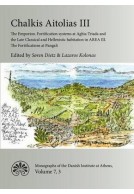Google Books previews are unavailable because you have chosen to turn off third party cookies for enhanced content. Visit our cookies page to review your cookie settings.
Smakkerup Huse (Hardback)
A Late Mesolithic Coastal Site in Northwest Zealand, Denmark
Imprint: Aarhus University Press
Pages: 288
Illustrations: illus
ISBN: 9788772889597
Published: 31st March 2005
Script Academic & Professional
Pages: 288
Illustrations: illus
ISBN: 9788772889597
Published: 31st March 2005
Script Academic & Professional
You'll be £26.95 closer to your next £10.00 credit when you purchase Smakkerup Huse. What's this?
+£4.99 UK Delivery or free UK delivery if order is over £40
(click here for international delivery rates)
Order within the next 7 hours, 29 minutes to get your order processed the next working day!
Need a currency converter? Check XE.com for live rates
(click here for international delivery rates)
Order within the next 7 hours, 29 minutes to get your order processed the next working day!
Need a currency converter? Check XE.com for live rates
Traditionally, the Mesolithic has been regarded a time of cultural regression in northern Europe, relieved only around 4000 BCE when the enlightened villagers of the Neolithic arrived on the scene, bringing with them the beginnings of agriculture. But new evidence in the last 30 years has led archaeologists to think of the early postglacial foragers that lived in the Mesolithic as complex, sedentary coastal dwellers who made the era a time of innovation, interaction and successful adaptation to a rapidly changing environment. The excavations at Smakkerup Huse help to flesh out this revised portrait. Al though the settlement area (5000 to 3900 BCE) on land had suffered marine erosion, submerged deposits adjacent to the settlement included a midden and a fishing and boat-landing area in excellent condition, with numerous organic materials surviving intact. Deposits included fire-cracked rock, charcoal, oyster shells, amber and teeth pendants, a complete rack of antlers, pieces of dugout canoes and a bow, pointed wooden stakes, large pieces of bark and fungus, thousands of hazelnut shells and fishbones, a fish trap fragment, fishhooks, worked bone and antler tools, potsherds and more than 350 projectile points. The most intriguing artefact was a small painted cobble, a type previously unknown from the Danish Mesolithic. The site also yielded remains from some of the earliest domestic cattle in Denmark, raising important questions about foraging adaptations and the transition to agriculture. Besides specialist reports from geology, archaeozoology, palaeoethnobotany, archaeological chemistry and conservation science, there are useful chapters describing the Mesolithic in southern Scandinavia and situating the Smakkerup Huse finds within the context of this time of critical transition.
Other titles in Aarhus University Press...













